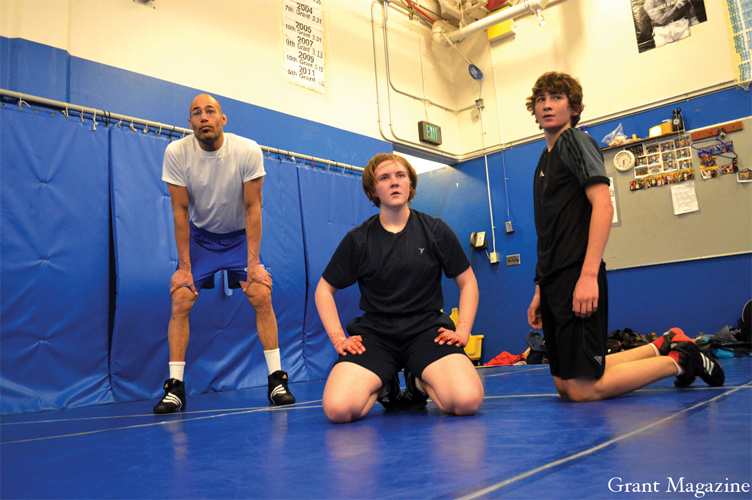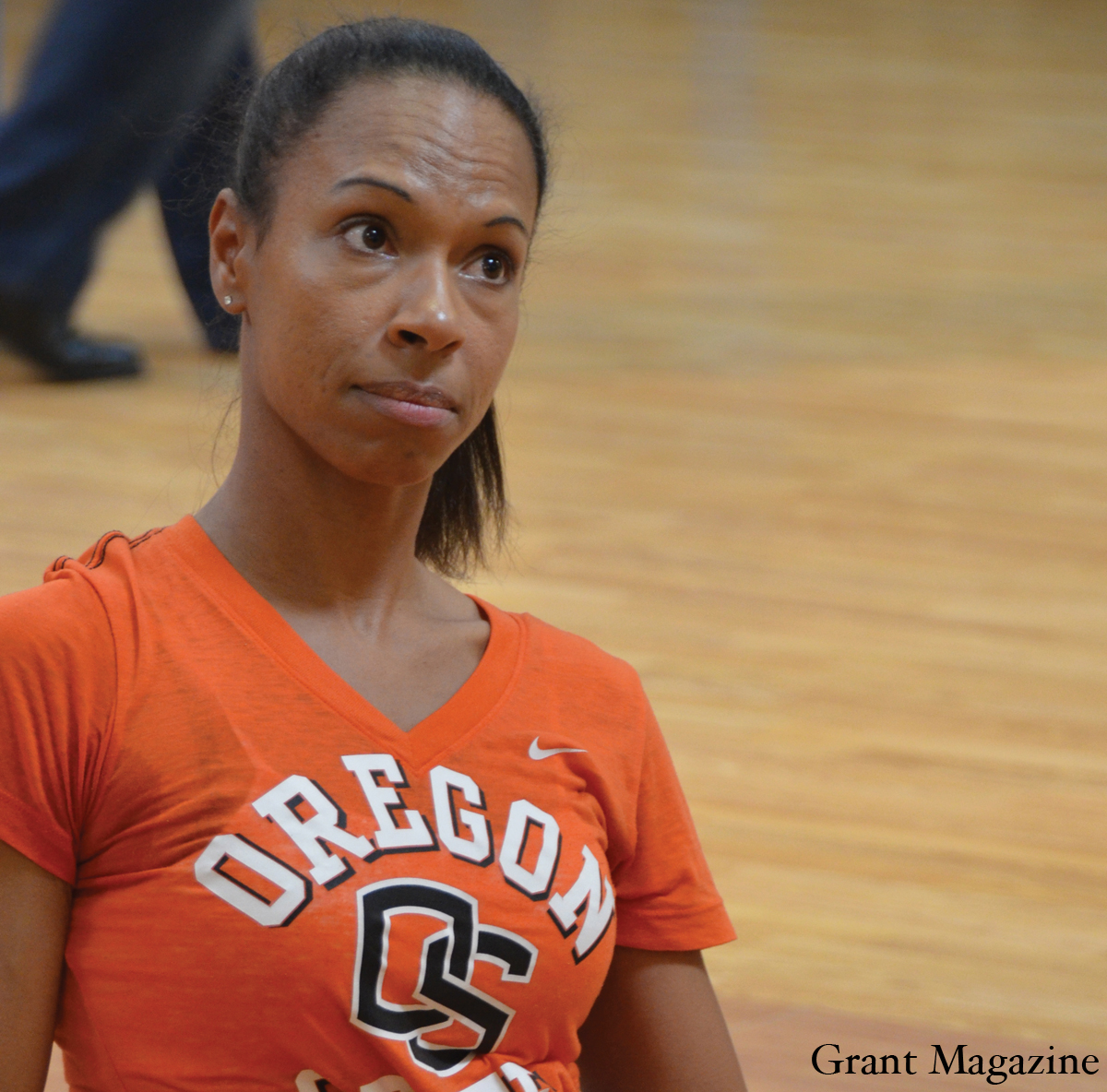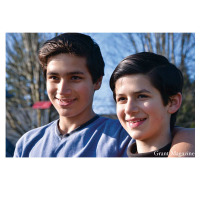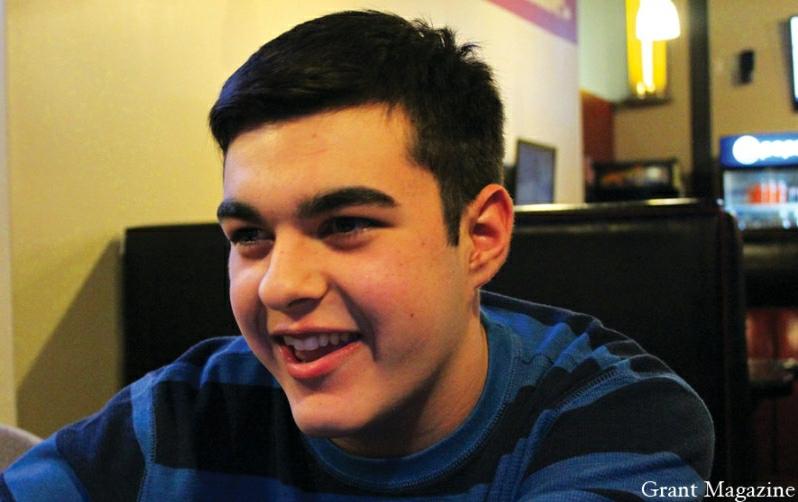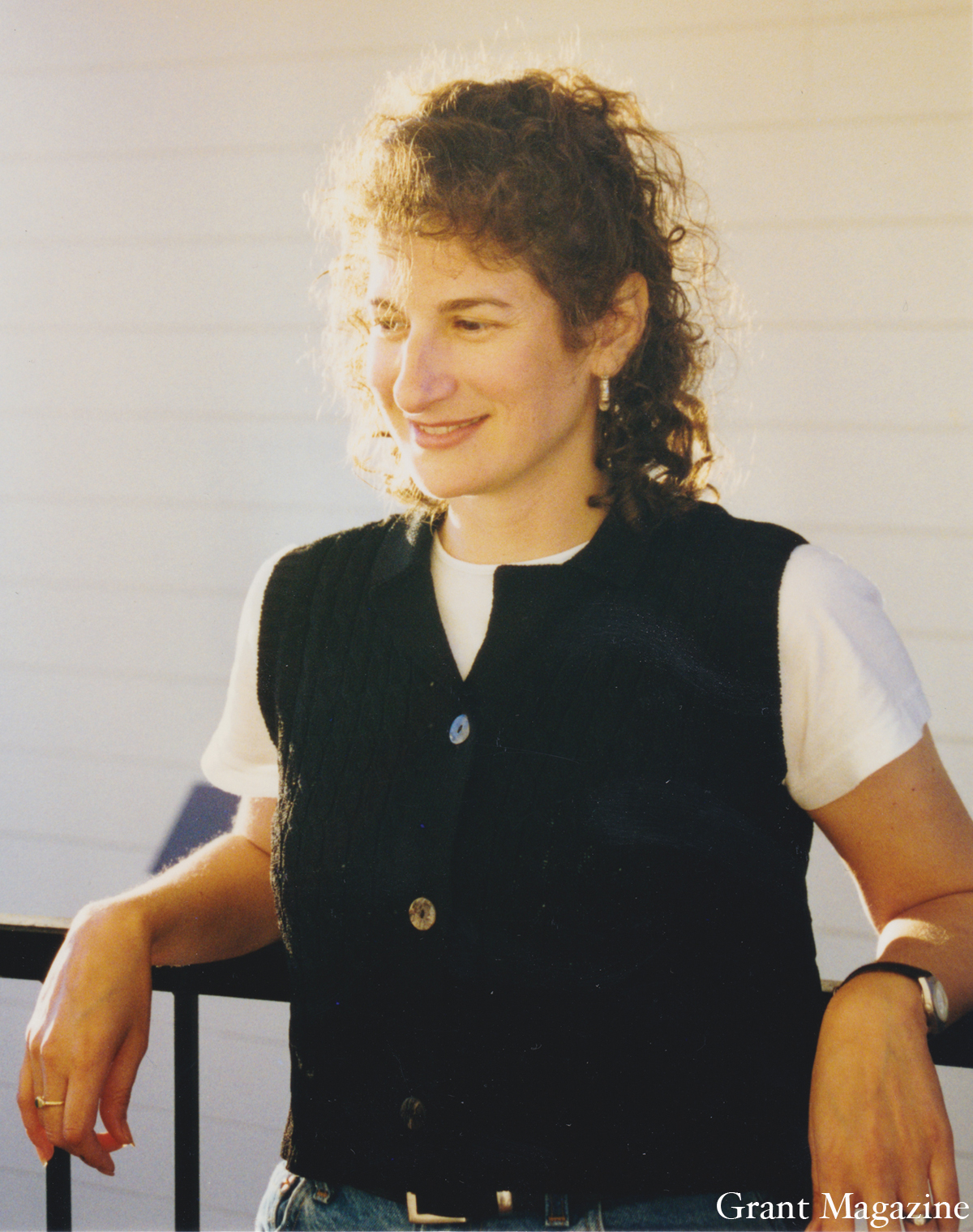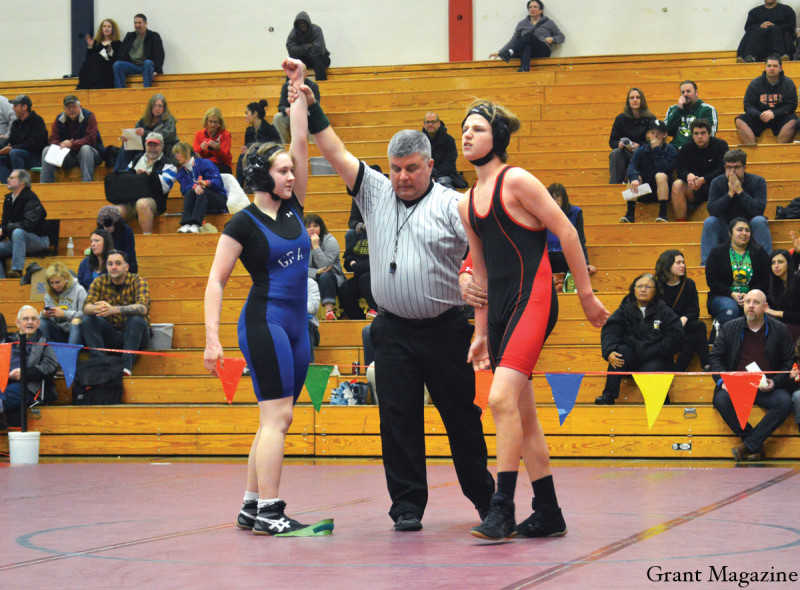
Hannah Posey-Scholl spies the wrestler from Lincoln High School who she’s about to battle on the opposite side of the gym. The two are competing in the Portland Interscholastic League championships.
Posey-Scholl, a Grant High School junior, knows the kid’s tough. She recognizes the look she’s seen from boys since she started wrestling two and a half years ago. He oozes with cockiness and probably thinks he’ll win a match against an opponent who is just a girl.
She cranks up the volume as Linkin Park, her favorite band, rings in her headphones. She’s getting energized.
Her mom, Darby Scholl, sits in the stands with Posey-Scholl’s two little brothers. She’s excited to see how her daughter does, acknowledging that wrestling has helped raise her confidence. “You know, this is a good thing in her world,” she says.
“It made me like this school and made me proud to be a General.” – Hannah Posey-Scholl
As the wrestlers begin the match, they struggle to get one another down. Posey-Scholl gains the upper hand and eventually is declared the winner.
Wrestling, she says, “makes me more confident in myself as a person.”
For Posey-Scholl, wrestling also makes her feel connected to Grant. She’s been a member of the team for three years now. She’s watched girls filter through the system but never fully commit. “I’ve done a lot of things where I have been the only girl, so it’s not really any different in wrestling,” she says. “I am just there and I am just a part of the team.”
The role of athletics for girls in high school has exploded since the landmark federal Title IX decision in 1972 that created a more level playing field for females. Gone are the days when girls sat on the sidelines cheering the boys.
The sport of wrestling hasn’t always held much attraction for most high school girls. But Mike Moyer, the executive director of the National Wrestling Coaches Association, says: “They are growing by leaps and bounds and we are doing everything in our power to keep the numbers growing.”
Since 1994, the number of female wrestlers in high schools throughout America has grown tenfold from 804 to 8,727, according to NWCA statistics.
When it comes to wrestling, the sport has been an anchor of sorts for Posey-Scholl. “When I came to Grant, I absolutely hated it,” she recalls. “I didn’t want to participate in anything. Didn’t want to go to the dances or any of the sports events, or participate in any clubs or teams.”
Wrestling, though, made her feel like she belonged. “It made me like this school and made me proud to be a General,” she says.
At age 6, Posey-Scholl moved from a suburb of Chicago to Portland after her parents divorced. She says as a kid she only managed to participate in a small amount of gymnastics and soccer when she was in first grade.
She attended Laurelhurst School and fit right in. “It was a great school,” she says. “I had great friends, and there were very good teachers.”
Something changed when she hit middle school and Posey-Scholl had a defiant phase. She describes herself at the time as being rude and having minor conflicts with friends.
In seventh grade, things calmed down after Posey-Scholl witnessed a huge fight between two close friends. It got so bad that lawyers were involved.
When it became time to think about high school, one thing was for sure: Grant was not Posey-Scholl’s top choice. She took the SSAT in preparation to applying to Catlin Gabel School, a private school in Southwest Portland. But she changed her mind because the school didn’t have a full Japanese language program.
Her start at Grant wasn’t the best. She felt like all Grant was known for was football and basketball. “I just wasn’t interested, and the things that I was interested in were hardcore academics, and that didn’t seem to be present here,” she says.
Posey-Scholl says she also hated that she was unable to take choir. “There were a lot of opportunities that I really wanted that got cut or moved or messed with between eighth grade and my freshman year,” she says. “And I really hated the school because of that.”
But wrestling was different. She went to a workshop held by the coach at the time. Accompanied by two other girls, Posey-Scholl enjoyed the sport more than she expected. She ended up going to a practice. “That day at lunch, I called my mom and told her I was going to be home late because I was going to do wrestling practice,” she says.
Scholl was puzzled by the initial decision her daughter made because she had never been that into sports. “I was surprised,” Scholl recalls. “I knew that I was going to have to be open minded and not make assumptions. You know, because there is sort of a thick-necked perception of wrestlers.”
Posey-Scholl’s dedication grew each year and today she openly declares the wrestling room as her favorite place in the entire school. She’s often the first one in and the last one out.
She jokes that she spends all of her time doing homework, practicing wrestling or playing video games with her brothers. Her academic schedule is challenging, she says, including three advanced placement classes that keep her up well past midnight.
But the load doesn’t stress her because she looks forward to wrestling each day. “With wrestling, I come home in a great mood, loving the sport,” she says. “It just improves my day.”
Posey-Scholl entered the women’s wrestling state qualifier in Cottage Grove with a 3-11 record in the 132-pound weight class. She has wrestled mainly against boys but has had a few matches against girls.
Being the only girl on the team doesn’t bother her. “It’s a sport that is awkward for everybody whether you are a boy or a girl,” she says, noting there have been a couple of times when boys have refused to wrestle her.
Grant coach Travis Bonneau says he’s confident putting Posey-Scholl in the lineup at the varsity level. “Hannah does it, you know?” Bonneau says. “She has never backed down from a challenge. She has always stepped up to it. She is a good role model for the younger guys.”
Posey-Scholl leaves the backing down to others. Once a coach at an opposing school didn’t allow one of his athletes to wrestle against her out of fear that it would break the kid’s confidence if she were to beat him.
That’s something her teammate, senior Nash Casey, says would never happen at Grant. He’s wrestled with Posey-Scholl for the last three years. The sport may be dominated by boys, but you get used to a female opponent, he says. It’s “not any different than wrestling any other person on the team,” he adds.
That kind of attitude is one of the things Posey-Scholl’s mom likes about wrestling. When her daughter first started, Scholl worried about the risk of serious injury. “You’ve got a lot of goals in life and getting thrown down on your head would be a setback,” Scholl says.
It might be a risk, she acknowledges. But it’s “not a reason not to do it,” Scholl says. “I like seeing her happy, and when she comes home from a good practice she’s as happy as she gets.”
Posey-Scholl has an interest in computer coding. Recently, she has been working on coding some applications, including a digital school planner. She also has something in the works that produces quotes from one of her favorite shows, “Doctor Who“. Another application she created will calculate good teams for competitive Pokémon battles.
She is looking to go to college to study government and maybe international relations. So far, her mind isn’t made up on a particular college.
“I like seeing her happy, and when she comes home from a good practice she’s as happy as she gets.” – Darby Scholl
“Last year, I was really ready and excited to start looking at colleges, and going and visiting, and this year it’s kind of becoming more real,” she says.
She’s leaning more toward science-based occupations, but sometimes thinks about a job with the government. “I still don’t have a plan for exactly what I want to do,” she admits.
The question is, will she wrestle in college? Her mom has some doubts. “I think a lot of the schools that she is looking at don’t have women’s wrestling, so that’s going to be tough,” Scholl says. “But I think a lot of them have men’s wrestling, and I could see her figuring out a role that she could maybe train with them, or be a part of that environment and be useful.”
Scholl pauses and then chuckles. “I would never want you to end up being a stat girl someplace if that’s not palatable to you,” her mom says to her.
Posey-Scholl says maybe she’ll start a club team at college. Or maybe she’ll just go for it and wrestle with the boys. “It was pretty much an automatic clique,” she says, “and I decided that this was really fun, and that I had to keep doing it.” ♦

